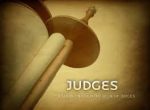Vol. 2, No. 4 – 2017
A man named Micah lived in the hill country of Ephraim. Judges 17:1
In all my life, I have never heard a single reference from pulpit or song writer or study leader or anyone else at all . . . never one single tiny whispered sound . . . that related to the Micah of the Book of Judges. The reason is that the story is so crazy, so mixed-up, that obviously the parsons and clerics are too embarrassed by it to let out a single peep—John Hercus
In Judges 17:1-13 we find the story of a widow and her son, Micah. At the death of dad, the equivalent of $1000 disappears. That may not sound like a lot in today’s economy, but it is a huge sum in that day. The widow looks for the large sum without avail. Actually, Micah stole it, using the cash to make investments.
Not because he feared his mother, but because he found there was a curse associated with the money, he returns it to his mother. A sorry mess follows. The cursed money is posed as an offering to the Lord in the form of making of it an idol. Micah and his mother set up idolatry in the family. The mother pretends to dedicate the whole sum to the Lord; however, only 1/5 is actually used. Seems reasonable, does it not, to hold back in order to do well in life.
The $200 brings a fine hand-made silver idol. These two characters remind us of another pair in the Book of Acts, who plotted something similar—Ananias and Sapphira (Acts 5:1-11).
This act of the widow and Micah should have never happened; they were familiar with the injunctions of God’s Law and Covenant that forbid an act such as this.
Be careful not to break the covenant the Lord your God has made with you. You will break it if you make idols of any shape or form, for the Lord your God has absolutely forbidden this. Deuteronomy 4:23-27
Micah and his mother had a house full of gods. They might have shuttered at worshipping Baal; however, they felt OK with human-formed idols that spoke to syncretism.
Today, supposed leaders substitute accountability using toys, liturgical rubbish, paraphernalia, and even some left over pet rocks. They create shrines in order to grasp a supposed upward bounce in authority and respect.
Micah even bowed to the need to be looked upon by the culture as “one with them.” It was a season of self-flattery. He appointed to himself a star aide—a Levite to be his priest (his own son).
In those days Israel had no king, so the people did whatever seemed right in their own eyes. Judges 17:6
It is a tragic error for a person to create an environment that portends to be the right thing to do, knowing it is wrong. Leaders can be caught in the trap; perhaps you also can be entrapped.
A person’s pride, ignorance, and self-flattery underscores the sense of self-justification, magnification, and daring improprieties in an attempt to rise above others. Most often when a leader seeks to rise above, they do not see the stupidity they embrace, nor do they compare their actions, speaking, and thinking against absolute truth.
It is always the right time to destroy false idols and get right in the heart. Ezekiel 14:6-7
